In the past decade there has been a huge increase in the level of corporate involvement in skateboarding, and we may be returning to a form of skateboarding that Steve Rocco, Mike Vallely, Mark Gonzales, and others desperately tried to escape in the early 1990’s.
New members within the skate community, like Eric Wiseman, Phil Knight, Herbert Hainer, the Maloofs, Gary Ream, William Sweedler, Neil Cole, and Andrew Kline, are all challenging what it means to be a skateboarder and how we skateboard. These men (that have probably never stepped foot on a skateboard) run or are the money behind VF Corp [Vans], Nike, Adidas, Maloof Money Cup, Woodward, Sequential Brands [DVS], Iconix [Zoo York], and Park Lane Sports Investment Banking [Street League]. Through their economic capital, and power outside of skateboarding they have been able to force their way into powerful positions within skateboarding and are able to directly profit off of our activity. Should we care if non-skaters are allowed to hold powerful positions in our culture? Should we care if skaters associate with these people and buy their products? Will it change how we skateboard, how we view ourselves, and how we view the world?
Of course! As skateboarders we all share social space and none of us exist in a vacuum (in some way all of our actions affect the skate culture as a whole and every skater within it). Within this social space our collective actions have produced and emphasized how important creativity, autonomy, cooperation, and fun are within skateboarding. These values make up the dominant ideology within skateboarding, which shapes our identities, how we view the world and how we act within it. But as more and more corporations enter the activity, they are challenging and attempting to shift the dominant ideology and performance of skateboarding into something that allows them to rationally fulfill their sole purpose: the pursuit of profit. If they are successful it may not change the ideology or performance of skaters like myself that have been involved in the activity for many years, but it will change the ideology, the space, and economics of skateboarding for younger skaters, and alienate older skaters from a social world they helped create and maintain until it was invaded by and sold to outsiders.
Many of these outsiders are attempting to run skateboarding with the same principles that drive many modern corporations, which are completely incompatible with street-skating as we know it. As George Ritzer points out in The McDonaldization of Society, businesses attempt to operate in an extremely efficient fashion. They focus on making everything quantifiable (skatemetrics) rather than focusing on creating subjective quality (“best” video part), they want everything to be predictable (i.e. standardized, the same experience every time), and they want all aspects of a business or activity to be easily controlled, basically the antithesis of what skateboarding is today. As the corporation’s values become more and more apart of skateboarding and influence the ideologies of individual skaters, the greater the potential that our activity will fundamentally change. Skateboarding won’t be like the activity we all know today, instead it will have an ideology and a performance similar to that of football, or, as Rob Dyrdek is praying for, the UFC.
If corporations continue to gain influence within our culture the dominant form of skateboarding may move from the streets, where it is difficult to control or directly profit off of, into the contained space of the park. Additionally the skate video may also fall to the wayside. Why spend the money to send a skate team to Barcelona for three weeks to film ten tricks, when you can fly one skater to Gilbert, AZ for a couple of days and have your logo seen throughout the world on ESPN?
Instead of inefficiently, creatively, and collaboratively creating skate videos, skaters will efficiently and competitively enter into the highly predictable, standardized, quantifiable, and controllable world of mega-contests. In this social-world, there is no time for a skater to push himself spending hours trying to land a trick, because it is inefficient. There is little room for creativity (i.e. no backside 50-50 finger-flip) because, “it isn’t good strategy.” And there is no reason to seek out new skate spots as it more efficient for all skate contests to take place in the same stylized spaces. Whether you are in Gilbert or Toronto you can watch Chaz Ortiz jump down the exact same 10 stair. If corporate skating begins to dominate there will be little room left for the skating that Louie Barletta, Chris “Mango” Milic, or Jeff Stevens do, there will only be room for the (amazing, but) standardized and predictable skating of Greg Lutzka, Ryan Sheckler, and Nyjah Houston.
”Skateboarding is separating into two poles: one where a few businesses and a very small group of skaters are making lots of money, while everyone else is fucked.”
A strong corporate presence within our culture will change the economics of skateboarding. As we have seen in the past seven years, Nike and Adidas’s presence has escalated the number of skater owned skate shoe companies that have gone out of business, which limits the ability of skaters to influence skateboarding. Skater owned companies are in dire economic situations, not because of natural fluctuations within the skateboard market, but because of the imbalance of economic power within skateboarding that is evident in a post-Consolidunk era.
The entrance of Nike, Adidas, and other mega-corporations, has created a situation similar to what many popular but small coffee shops faced when dealing with Starbucks. Starbucks would open across the street from a local coffee shop, and even if the local coffee shop was doing well prior to Starbucks entrance, the small shops couldn’t afford to operate in such close proximity to a Starbucks “Café,” which could afford to run at a loss, dump huge amounts of money into advertisements and promotions, and do huge amounts of market research on potential customers because of its deep pockets. Eventually the small café would go under, which allowed Starbucks to dominate the local market, not because their product was superior, but because of their economic might (see Naomi Klien’s book No Logo and Ocean Howell’s “Extreme Market Research”).
Corporations are also changing the idea of what skaters think they deserve to be paid, how much profit companies… err shareholders should expect to profit off them, and how little corporations need to invest into the culture as a whole. It has become “common sense” that Chris Cole and other mega-stars deserve to make an average of $40,000 per month, while many pros pull a salary much closer to $2000 a month, or are being dropped in order to pay for the mega-stars contracts. It has become reasonable that the publicly traded corporation Zumiez does hundreds of millions in sales in each year, but doesn’t sponsor one skater.
And we are all amazed that the Maloofs are willing to put up a $500,000 cash prize, when in reality $500,000 is nothing when we consider the fact that the Maloof family is worth approximately 1 billion! 500k is 1/2000 of their net worth. This is the same as if the average American family (net worth 77K) was to “give away” $15 (I put give away in quotes since the Maloofs profit off the Money Cup and do not lose money). It seems that skateboarding is separating into two poles: one where a few businesses and a very small group of skaters are making lots of money, while everyone else is fucked. Sadly, our new ideology allows us to see this as normal, when in reality this is a very unusual state of affairs for skateboarding.
Finally, the large corporations buying, selling, and trading skate companies drastically affects the structure of the skateboard world. We recently saw this when Mark Ecko sold Zoo York to Iconix, who then decided it would improve their bottom line if they abandoned Zoo York’s “skate program” and dumped some of their riders.
Another example of the consequences of skateboard companies being bought and sold as commodities instead of being treated as pillars within the skateboard community is VF Corp’s acquisition of Timberland. VF Corp recently purchased Timberland, which had owned Ipath. A few months before VF Corp acquired Timberland Ipath was sold to Klone Lab, which lead to the restructuring of Ipath and the loss of a good portion of the team (as we see with Birdhouse’s new pro Ben Raybourn, the up-coming ams Ryan Reyes, Ryan Lay, and many others all leaving the company).
Corporations only value skate-companies and skateboarders in relation to how much capital they can generate for a group of shareholders, instead of valuing them as important parts of our culture. In the world of corporate skateboarding, skate-companies and skaters are simply commodities that are meant to be bought, profited from, and then thrown away.
If the corporations continue to increase their hold of skateboarding the ramifications for skateboarding in terms of culture, space, and economics will be huge. Instead of waiting to see Mango’s next creative part, the hijinks of the Baker Boys or the adventure of Wallner’s next skate-documentary we will be stuck watching Alex Klein attempt to sell competitive skateboarding to outsiders and Sheckler win at skateboarding by being the “best”. Rather than being anomalies these skaters will become the norm if we return to the world of corporate skateboarding, and we will end up in a worse spot than we were in the 1980s when Vallely, Rocco, Gonzales, and others all first rebelled against corporate control.
Related Posts
Comments
Popular
-
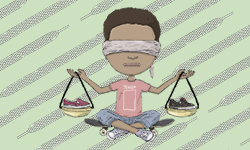 WHAT WOULD MAKE SKATERS DITCH THE BIG SHOE BRANDS?
WHAT WOULD MAKE SKATERS DITCH THE BIG SHOE BRANDS?
We asked younger skaters how small shoe brands could win back their business from the big budget behemoths.
-
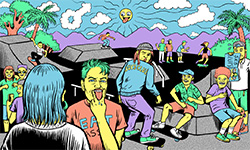 MY EXPERIENCES IN SKATEBOARDING
MY EXPERIENCES IN SKATEBOARDING
"I've been terrified of garnering the reputation of 'ramp-tramp' or 'pro-ho' just from spending time with skaters."
-
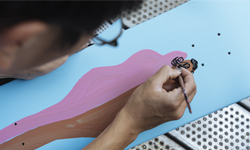 MEET UNITY, SKATEBOARDING’S MOST PROGRESSIVE CREW
MEET UNITY, SKATEBOARDING’S MOST PROGRESSIVE CREW
"Never has my gay life intersected with my skateboarding life. If anything, maybe I’d worked to pull them apart."
-
 WHAT HAPPENED TO GERSHON MOSLEY?
WHAT HAPPENED TO GERSHON MOSLEY?
From punching Andrew Reynolds, to not getting "pimped" by the industry, Gershon covers everything you wanted to know.
-
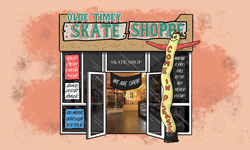 HOW CAN WE HELP KEEP SKATE SHOPS ALIVE?
HOW CAN WE HELP KEEP SKATE SHOPS ALIVE?
For years brands and skaters have blindly cried "support your local," but we asked shop owners about other ways we can all provide actual help.





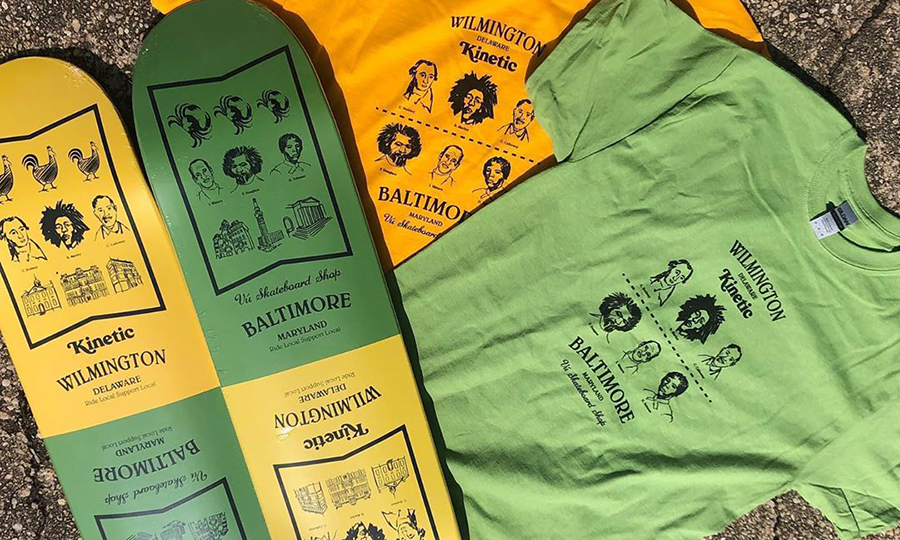

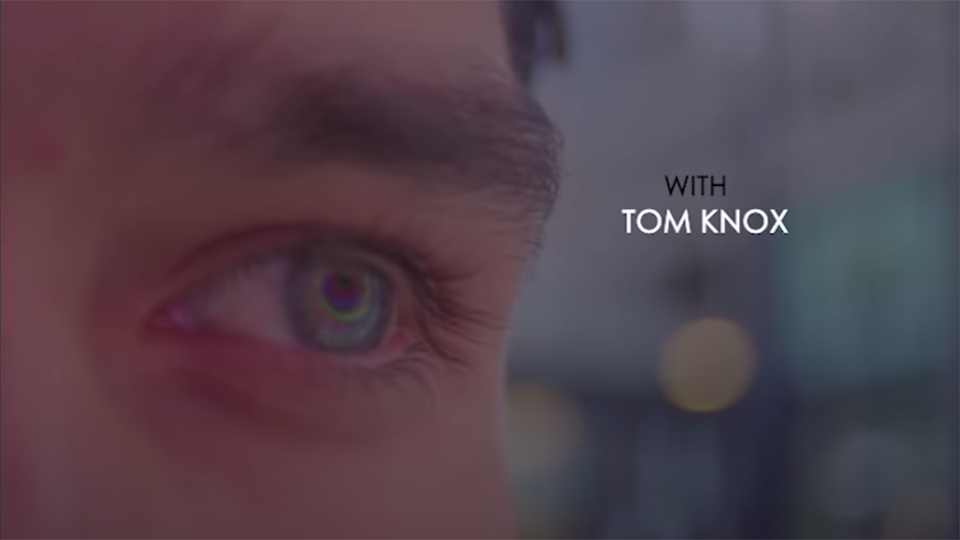

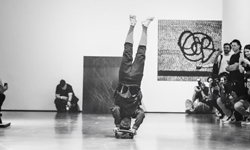
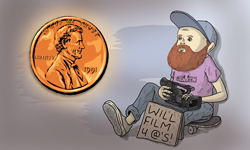
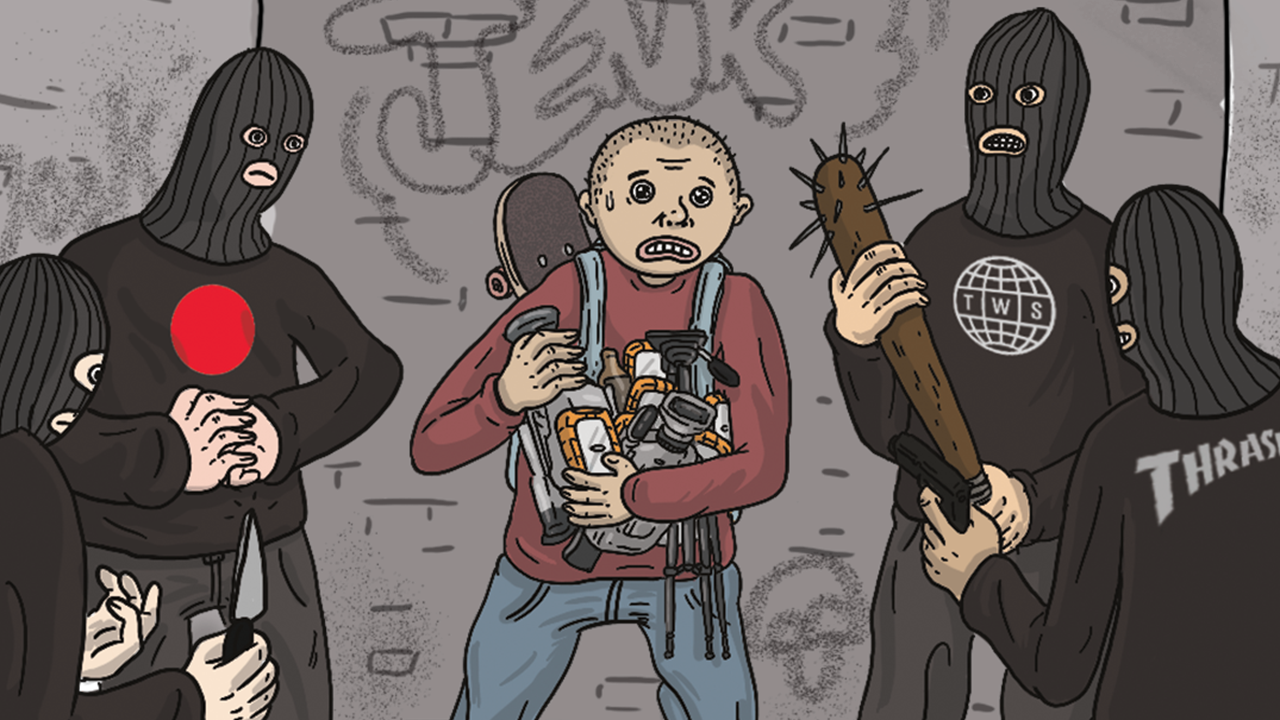
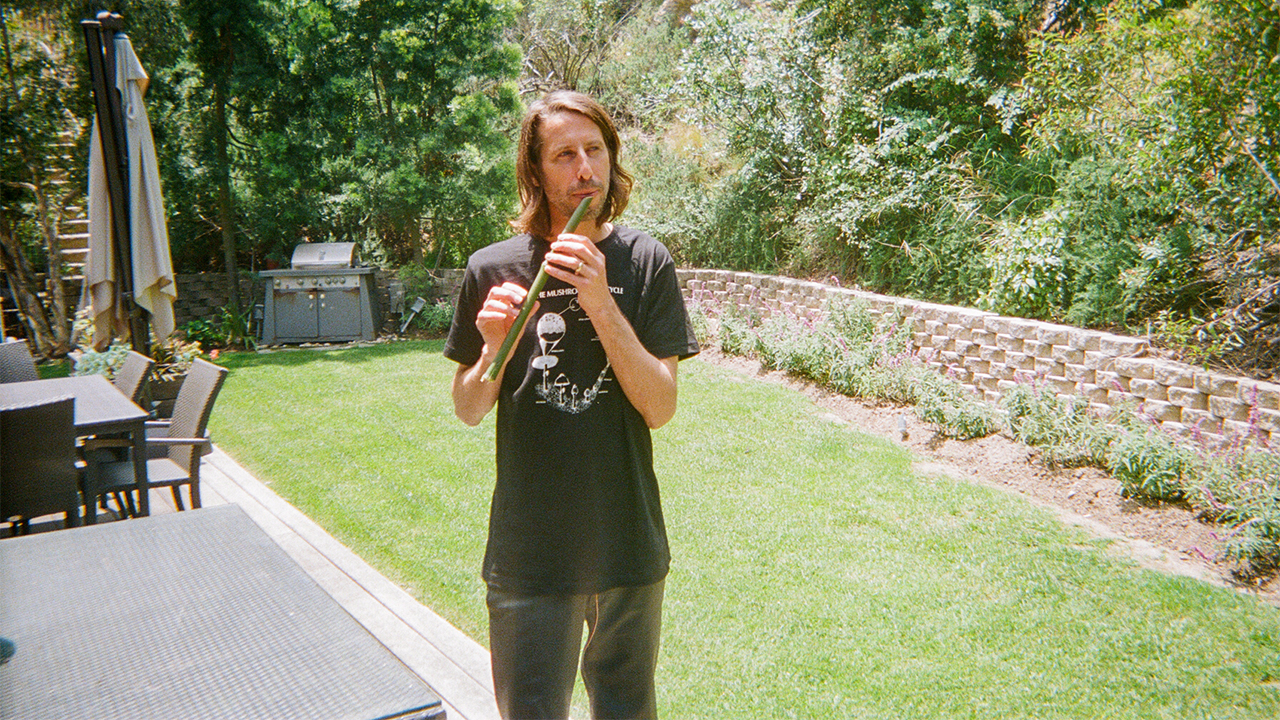
December 1, 2012 12:56 am
Wake up. Some of these corporate companies like Nike, vans etc are doing more to keep the culture of skateboarding in tact than these so called “core” companies. Vans has that collab with spitfire that built DIY spots all over and Nike has the support your local program aimed at helping kids buy kicks from real skate shops. All businesses have to make a profit to survive, which is common sense. Not all the corporate companies do it right, but there are a few.
On another note, most of these corporate companies make better quality products than the core ones. You tell me you think a pair of Vox shoes will last longer, or are betters than any nikes. Most corporations make a superior product. I’m all for keeping skating as authentic as possible, but I’m spending my hard earned dollars on products I think are better than others.
December 1, 2012 1:28 am
What shoe is still skater owned?
December 1, 2012 7:53 am
Scary but true, I’m trying to orginize our 3rd Annual Skatepark Fundraiser Contest & Demo to raise money for the skatepark we got approved for over a year ago to be held in Marlinton, WV on Saturday April 6th 2013. I’ve been trying to get Sponsors / Companys to donate a prize for the winners for 2 months now and heres a list of companys that in all my years of skateboarding I’ve helped make rich and even though its a really good cause to give skaters somewhere to skate in a town witch is elligal to skateboard in, they gave me the old “Sorry Cant Help Ya line”. CCS, Dark Star, Venture Trucks, Thunder Trucks, Spitfire Wheels, Destructo Trucks, Ricta Wheels, Independent Trucks, Vans, Plan B, Element, DVS, DC, Redbull, Zero, and yes theres lots more and it really make me wonder how many of these companys are accually ran by real skaters. One things for sure I will not give up and will make sure that this town ends up with a skateboard park with or without any help from the big corporations because of my love for skateboarding and no other reason. peace
December 1, 2012 11:30 am
First of all nearly every skateboard company is a corporation, so re-title the article so that it’s accurate. This article could be ripped apart in so many ways. As a 24 year long skateboarder who never stopped when the trend faded I can say that skateboarders are followers and this article is shit. We are a niche group doing the same things as all major endorsement based sports just on a smaller level. Our models are the same though and each small company looks to the bigger to see what they should do to become a huge corporation. Skateboarding was funded by big surf companies in the beginning and everyone seems to forget that. I think Vans is and always has been a pretty major corporation. When was the last time you saw Steve Van Doren, George Powell or any of the old guy skate company owners on a skateboard? There are only a handful of company owners that actually skate still and most of those have pro models out.
Lurper, have you ever owned and run a company? The bottom line becomes a topic on the first day and your “core values” typically go out the window.
What’s the difference between Pierre Andre (owner of Sole Tech) making millions off skateboarding or the Maloofs? Neither Pierre or the Maloofs are helping it, just profiting. Pierre doesn’t skateboard anymore, just rides cruisers to meetings and dresses in skate clothes. He doesn’t re-invest in skateboarding, he profits from it. How many people have had their feet destroyed in shoes that were made worse for your feet based on the bottom line rather than the fact that it’s better for skateboarding?
Why did Koston leave éS? Because he had made Pierre a lot of money and wanted a piece of the pie, Pierre said no so Koston left. Nike didn’t try to kill skateboarding they just picked up the pieces from those “core” companies who made poor, greedy corporate like decisions. In fact Nike puts a lot of money back into skateboarding, just ask anyone from Portland or Burnside.
Does anyone remember when PJ Ladd became popular? Sole Tech was trying to shove money and cars down his throat for him to have a signature shoe but he wasn’t into it. Whats the difference between a “core skate company” like Sole Tech (that is run by non skateboarders) trying to coerce a rider into a contract and the Maloofs paying half a million?
You mention Rocco fighting against corporate control. I think what you meant to say was, “Rocco didn’t like to be controlled so he took his money, put other “core companies” out of business and became the biggest corporation in the game so he had all the control”. What’s the difference?
What about each company/brand and their “look”? It’s well known that you can only ride for companies that fit your image. However we have all seen many of the top riders change from “hesh” to “fresh” or vice versa for a contract on a better brand.
Mega corporations aren’t changing skateboarding. Skateboarders are. They are growing up and realizing they don’t want to work in the warehouse of their former sponsor for the next 20 years. They want to have normal lives with houses and families but that doesn’t happen when you go back to the company who just made shit loads of money off of you. They say, “we pay $9 an hour for our warehouse employees, you can start Monday.” Not, “oh, hi, thanks for buying me a house, retirement package and making my wife ridiculously happy with all the money you made us even though your knees, ankles and back are fucked for life.” No, it’s work in the warehouse.
Quit blaming everyone else for your problems. The problems aren’t with the big corporations they are with the small companies that shit on their riders. The riders then go to the bigger corporations who may be profiting off of them but are at least paying them what they are worth. Medical bills are expensive and if you’re supposed to put out a banging video part you should at least have a health care plan to cover the costs. Oh, there’s another nasty hidden fact of skateboarding. When you are sponsored you are a contract rider so you don’t get benefits. Hopefully your checks from each sponsor add up to more than $2,000 a month or you won’t be able to pay that doctor bill for your broken ankle and your sponsor will kick you off for the next best thing. Thanks core companies, you are just as shitty as the big ones.
December 1, 2012 7:38 pm
I found this Ocean Howell quote and I thought it related to your post. “There are plenty of skater-owned skate companies that regularly make decisions that can only be thought of as foolish from a business perspective, decisions that are seriously irrational, deeply inefficient. To hell with efficiency and rationality. Unfortunately, sound business decisions and personal convictions are often incompatible. When there’s some conflict between the two, you have to make a choice, and I think it’s reasonable to fear that non-skate corporations will go for the rational, efficient business decision, because business is their only interest in skateboarding to start with-they have no personal conviction about skateboarding.”
Also I don’t remember this article saying George Powell wasn’t a businessman? Do you remember what company Vallely left and complained about being too corporate? Hint it was Powell.
I agree to think that just because a company is skater owned its perfect is ridiclous and maybe the article/author could have pushed this a little harder, but if I remember right Dyrdek knows how to skateboard right? but he was criticized for having a corporate ideology and trying to sell corporate skateboarding? Alex Klien wasn’t he the SLAP OIAM guy that used to ride for City? I think he might have been criticized as well.
Yea Rocco wasn’t a saint. But Rocco’s road to “controlling” huge amounts of the skateboard market (along with Fausto and Balma) was built on co-owning skateboard companies with other skaters. Not to say his actions against Simon Woodstock were nothing short of disgusting, and everything he did was perfect, but to not credit Rocco for assisting in developing the no rules feel and fuck you attitude and ideology of street skateboarding and originally treating his riders better than the corporations is ridicilous.
Can you imagine what skateboarding would look like if Rocco, Gonzales, Vallely, Alva, etc., never said fuck you to the businessmen that originally ran skateboarding? It probably look a lot like Street League.
And what happened to all the Savier riders after Nike stopped that venture? What happened to Nike’s surf team? Are they all living in mansions with picket fences, with a wife, kid, and a puppy? Are they all living the white suburban American Dream?
December 4, 2012 3:19 pm
interesting you mentioned being a contract rider and dealing with health and medical costs. people forget about taxes and the IRS as well. there’s alot of skaters who lost it all for being uninformed or ignoring this issue.